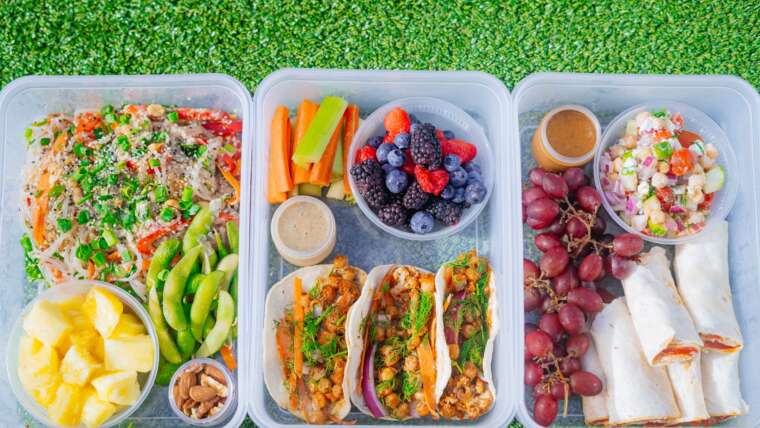A vegan diet can offer incredible health benefits, but like any eating plan, it’s essential to be mindful of potential nutritional gaps. Without proper planning, a vegan diet may lead to certain deficiencies, which can impact health over time. This guide explores some common health risks associated with veganism and provides solutions to ensure a balanced, nutrient-rich lifestyle.
Potential Health Risks of a Vegan Diet and How to Address Them
- Vitamin B12 Deficiency
- Risk: Vitamin B12 is crucial for nerve function, brain health, and red blood cell production, but it’s primarily found in animal products. Without adequate B12, vegans risk fatigue, nerve damage, and cognitive issues.
- Solution: Take a B12 supplement or consume fortified foods, such as nutritional yeast, plant milks, or cereals. The recommended intake for adults is around 250 mcg daily or 1,000 mcg twice a week.
- Iron Deficiency (Anemia)
- Risk: Iron is essential for transporting oxygen in the blood, and deficiency can lead to anemia, causing fatigue, weakness, and impaired immunity. While plant foods contain non-heme iron, it’s less easily absorbed than heme iron from animal sources.
- Solution: Include iron-rich foods like lentils, spinach, quinoa, and fortified cereals in your diet, and pair them with vitamin C-rich foods to enhance absorption. In some cases, an iron supplement may be beneficial, especially for women and athletes.
- Omega-3 Fatty Acid Deficiency
- Risk: Omega-3s, specifically DHA and EPA, support heart, brain, and eye health. The body converts ALA (found in flaxseeds, chia seeds, and walnuts) to DHA and EPA, but this conversion rate is low.
- Solution: Incorporate ALA-rich foods regularly and consider an algae-based omega-3 supplement for direct DHA and EPA intake.
- Calcium Deficiency
- Risk: Calcium is vital for bone and dental health. Vegans risk lower calcium intake, especially if they don’t consume fortified foods or alternative sources.
- Solution: Use fortified plant milks, tofu, tahini, almonds, and dark leafy greens like kale and bok choy. If necessary, take a calcium supplement, aiming for 1,000–1,200 mg daily.
- Vitamin D Deficiency
- Risk: Vitamin D supports bone health, immune function, and mood regulation. Limited sun exposure can lead to deficiency, which may cause bone density issues.
- Solution: Spend time outdoors when possible, and consider a vitamin D2 or D3 supplement (derived from lichen for vegans). The recommended daily intake is about 600–800 IU.
- Iodine Deficiency
- Risk: Iodine is necessary for thyroid function, which regulates metabolism and energy levels. Vegans who avoid iodized salt or sea vegetables may risk deficiency, leading to symptoms like fatigue, weight changes, and hormone imbalance.
- Solution: Use iodized salt in cooking, and occasionally include iodine-rich seaweed, like nori or kelp, in meals. An iodine supplement is also an option, with a typical recommended dosage of 150 mcg daily.
- Zinc Deficiency
- Risk: Zinc is essential for immunity, wound healing, and DNA synthesis, but it can be harder to absorb from plant foods due to phytates. Deficiency may lead to a weakened immune system, skin issues, and poor appetite.
- Solution: Include zinc-rich foods like beans, lentils, chickpeas, pumpkin seeds, and whole grains in meals. Soaking beans and grains can reduce phytates and improve zinc absorption. Consider a zinc supplement if intake is low, especially during cold seasons.
- Protein Deficiency
- Risk: Protein deficiency is rare but can occur if a vegan diet lacks variety. Inadequate protein intake may lead to muscle loss, fatigue, and slow recovery from physical activities.
- Solution: Eat a variety of protein-rich foods, including beans, lentils, tofu, tempeh, quinoa, and nuts. Aim for a balanced intake throughout the day to ensure you meet daily protein requirements.
Strategies to Mitigate Health Risks on a Vegan Diet
- Plan Balanced Meals
Focus on building meals with a mix of proteins, healthy fats, and complex carbohydrates to ensure nutrient diversity and balance. Each food group offers specific nutrients crucial to overall health. - Incorporate Fortified Foods
Fortified foods, like plant-based milks, cereals, and nutritional yeast, can help fill gaps for nutrients like B12, vitamin D, iron, and calcium. Check labels to find products that match your nutritional needs. - Take Key Supplements
While whole foods are best, supplements like B12, vitamin D, omega-3s, and iodine are often recommended for vegans. A daily multivitamin that includes these nutrients can simplify supplementation and provide peace of mind. - Stay Active and Hydrated
Regular physical activity and proper hydration support nutrient absorption, bone health, and muscle function. Exercise also aids metabolism and can help you feel more energetic on a plant-based diet. - Get Regular Health Check-Ups
Blood tests can monitor levels of essential nutrients, such as B12, iron, vitamin D, and calcium, helping you adjust your diet or supplement routine as needed. This proactive approach ensures your vegan diet is supporting your health goals.
Read more about How Vegan Diet Improves Health…
Conclusion: Safeguarding Health on a Vegan Diet
A vegan diet can be healthful, diverse, and fulfilling when approached with balance and mindfulness. Understanding potential health risks and actively addressing them through proper nutrition and supplementation can help you maintain energy, vitality, and long-term wellness.
By making informed choices, you’ll enjoy the benefits of a plant-based lifestyle while minimizing any nutritional concerns.

